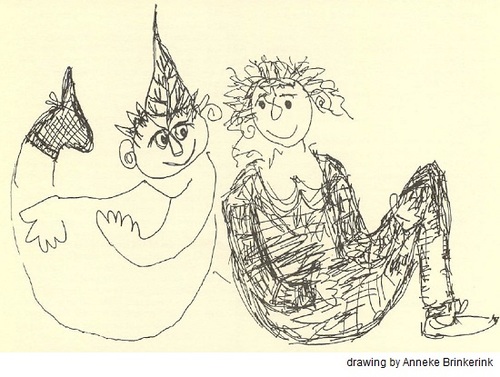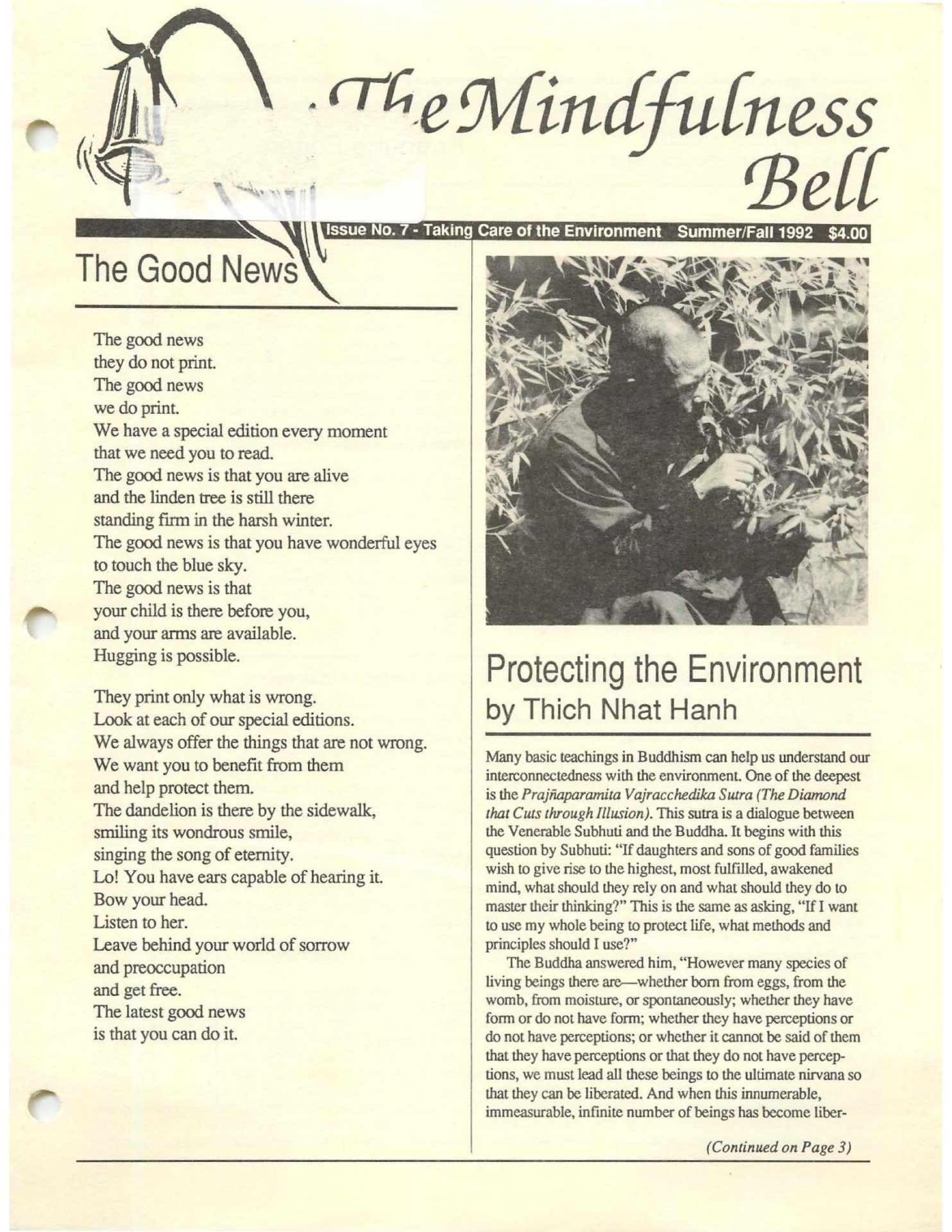By Thich Nhat Hanh in August 1992
Because a lot of suffering arises when we become angry or upset with our partner or other friends, at Plum Village we have created a “Peace Treaty” which we sign in front of the sangha. I would like to explain something about it.
The treaty was written to help us live happily together. It should only be signed after lengthy reflection and a lot of Dharma discussions between the concerned individuals.
By Thich Nhat Hanh in August 1992
Because a lot of suffering arises when we become angry or upset with our partner or other friends, at Plum Village we have created a "Peace Treaty" which we sign in front of the sangha. I would like to explain something about it.
The treaty was written to help us live happily together. It should only be signed after lengthy reflection and a lot of Dharma discussions between the concerned individuals. This is because the treaty is about practice. When one person gets angry at another, if they have a copy of this Peace Treaty, they will know exactly what to do and what not to do.
When you have signed the Peace Treaty, you have to abide by the agreement. The treaty becomes like the Buddha. We have to respect, follow, and abide by the terms. Otherwise, it can be very damaging, even dangerous. It is better not to sign the treaty, than to sign it and then not practice it. When the treaty is about to be signed, both of you should practice one Day of Mindfulness, with a lot of walking meditation. At the end of the day, you may bring each other into the meditation hall or some other special room. It is helpful if your community is present, in order to sign the treaty in the presence of the sangha and vow to respect and practice according to the treaty. Basically there are two parts to the Peace Treaty. The first concerns the one who is angry, who is suffering from anger. What should he or she do? What should he or she not do? The Peace Treaty should be signed in the spirit that we both want to live long and happily together.
Practicing the Peace Treaty should be supported by articles and discussions so that those people who do not have experience with the teaching can also learn and benefit from it. Such articles can give insight into the nature of the treaty and how to carry out the practice of the treaty. I believe that a Peace Treaty like this may become an important part of our practice in the future.
Part One
The first part of the treaty is about what the person who is angry should do and not do. The first article is to refrain from saying things or doing things that can cause damage. When we know that we are angry, it is best not to say or do anything. It would be too dangerous. We should have something like a moratorium on speech and actions. It is our tendency when we are angry to say and do things that escalate the anger in the other person and ourselves as well. We have to agree that when we get angry, we will refrain from saying and doing things.
The second article is to not suppress your anger. We should express something about our anger, but it is not yet the time. There will be a time in the future, even if it is only the time of three breaths, when it is safer and wiser to do so.
The third article is to practice breathing on your anger; taking care of your anger. Take refuge in the island of yourself. You know that anger is there, you don't suppress it, but you also don't deny it. You touch it with your mindfulness. In order for your mindfulness to be with you in this difficult moment, you nourish it by breathing mindfully. You produce mindfulness of breathing and you embrace your suffering in the loving arms of mindfulness. "I am angry. I suffer now." You have to really touch your anger and your suffering, using your mindfulness. You don't suppress it, ignore it, or deny it. You can do it in several ways-sitting or walking are perhaps the easiest. Go into nature and practice breathing while doing walking meditation. Nature-the vegetation, the fresh air-will help support you. If you need half an hour, spend half an hour. If you need three hours of walking meditation, practice three hours of walking meditation. According to the treaty, you have up to 24 hours to calm yourself.
You have to abide by the fourth article. You must tell the other person that you are angry and that you are suffering very much, and you have to say it in a calm way. You have to tell him or her within twenty-four hours. You have no right to keep it for longer than that. If you do, your anger becomes poisonous (also you violate the treaty), and it may destroy you and also the person you love. You may be ready to tell him or her in just five or ten minutes, if you are used to the practice, but the maximum is 24 hours. You can say something like, "Dear friend, what you just said this morning made me very angry. I suffered very much and I want you to know it." That is the substance of the message.
Then, according to the fifth article, you end with this sentence: "I hope that by Friday evening both of us will have had a chance to look deeply into this matter." Then you make an appointment (Friday evening is a good time to defuse all the bombs—big or small—so that you will have the whole of Saturday and Sunday for your enjoyment). If you think it might not be safe for you to tell him directly, if you are not confident that you can do it in a calm way and if the deadline of 24 hours is running out, you can use this form. We call it a "peace note":
Date:
Time:
Dear
This morning (afternoon), you said (did) something that made me very angry. I suffered very much. I want you to know this. You said (did):
Please let us both look back at what you said (did) and examine the matter together in a calm and open manner this Friday evening.
Yours, not very happy right now,
Signed:
If you use the note, you have to make sure the other person receives it. You can't say, "I put it on your table and you didn't look at it, so it's your mistake." This is for your own good, because the moment you know that the other person has received it, you will already feel some relief. It is best to tell him or her directly with a calm voice, but if you suspect that you will not be able to do it calmly, the next best thing is to use the note, fill out the form, and hand it to him or her. You have to make sure he or she gets it before the deadline. If he or she doesn't get it, it's your fault, and not the other's fault. That is important.
According to the sixth article, you should not pretend that you aren't angry. Perhaps you have too much pride—you are angry, you suffer, but you don't want to say that you suffer, because your pride is too great. Do not say things like, "I'm not angry. Why should I be angry? I do not suffer at all. There is nothing to be angry about. That is not enough to make me angry." Don't hide the truth. You suffer, you are angry. That is the fact. This is a very important part of the Peace Treaty. Pride should not be an obstacle, the thing that destroys our relationship. We are committed to each other, we support each other. We are a brother or sister to the other. Why should we be so proud? My pain must be your pain. My suffering must be your suffering.
According to the seventh article, while you are practicing sitting, walking, breathing, looking deeply, and living mindfully in your daily life, you focus your attention on these six points:
(1 ) You recognize the fact that you are sometimes not mindful. You are not skillful at times. You see how you have hurt the other person on a number of occasions in the past.
(2) You have to acknowledge to yourself: "I have the habit energy of getting angry very easily, of getting hurt very easily." You have to see and acknowledge this fact. If you need to, you should have a copy of the Peace Treaty with you so you can practice according to it.
(3) You must look into this: "The seed of anger is strong in me. I have to acknowledge that she or he is not the main cause of my suffering. The main cause of my suffering is the strong seed of anger in me. lt has the habit of manifesting itself so easily." Think of friends who don't get angry that easily. The seed of anger is also in them, but not as strong as it is in you.
(4) "The other person is suffering also, and because of this, he has behaved in an unskillful way. He has watered the seed of anger in me. I acknowledge him as a secondary cause of my suffering, and I also remember that he is not the main cause. He has said and done things to make me angry, he has watered my seeds." Perhaps he is not even the secondary cause. Perhaps it was your misperception that was the secondary cause. Often we get very angry at someone and then find out later that he was not the cause. It was our misperception. He did not mean to hurt us.
(5) Because the other is suffering, he or she is just seeking relief. He seems to be destroying you, but it is because he suffers terribly and he wants relief. When we get angry because something is said by the other person, we suffer and we believe very naively that if we can say something stronger and make the other person unhappy and suffer, we will get relief. This is unwise, but most of us do it. We have to look to see that the other person is not really trying to destroy us. She is only seeking some relief from her own suffering.
(6) I see that as long as he or she continues to suffer, I cannot be truly happy. If the other person continues to suffer, there is no way that you can be happy; because this is a relationship. Happiness is not an individual matter. If the other person suffers, you have to suffer. In order not to suffer, you have to help the other person not suffer. This is very true in a community of practice. When someone in the community is unhappy, the whole community cannot be truly happy. Everyone has to seek a discreet way to help that person. When that person has overcome his suffering, happiness in the community will become authentic. We all know that. There is a Vietnamese saying, "When one horse is sick, all the horses in the stable refuse to eat." The above six points are the objects of our practice of looking deeply. We have a few days before Friday evening. That time is to practice looking deeply.
The eighth article tells us that, during the process of looking deeply, if we realize our unskillfulness and/or our un mindfulness, we should apologize right away. We shouldn't make the other person feel guilty any longer. There is no need to wait until Friday evening. If we find out that we got angry because we have the habit energy of responding too quickly, or some misunderstanding, we have to go to the other person and say, ''I'm sorry I was so unmindful. I got angry so easily and without any basis. You didn't do anything to harm me. You didn't have any intention of making me suffer. It was just my fault. I apologize to you. Please forgive me." He will be relieved. If he continues to suffer, eventually you will get it. It is better to stop the cycle of suffering as soon as possible.
The ninth article tells us that if by Friday, you feel that you are not calm enough to talk about the matter, you should ask him or her to postpone the appointment for three more days or another week. We have the time. If you are not calm, it is not time to talk about it yet. We need to practice for a few more days.
Part Two
These are the six things the one who has made the other angry should practice:
First, when you see that the other is angry, do not make fun of him or her. Try not to say, "I haven't done anything, and you're angry." You have to respect his or her feelings of anger. A feeling needs time to die down. It has a life span- a moment to be born, some time to stay, depending on whether conditions are favorable or unfavorable to extend its life, and then it will die down slowly. Even if you see that her anger is not founded at all, that she is completely wrong, don't press her to stop being angry right away. That is against the natural law. Help her, or leave her alone so that her anger can die down.
Second, after you have heard the other person telling you that he is suffering or have read the peace note, don't press for an immediate discussion, because if you do press while the other is still angry, everything can be destroyed. Abide by the treaty and accept the Friday evening appointment. In the interim, you will have a chance to look deeply at the situation. "What did I say? What did I do to make him so angry?" While driving, walking, breathing, practice looking deeply. That is true meditation, even if you are not in a meditation hall.

Third, tell him or her that you have received the note and that you will be there on Friday evening. This is very important, because if she knows that you have received it, she will get some relief. If it is possible for you to say, "I know you suffer. I know," this too is very helpful.
Fourth, if you can apologize right away, do it. Don't wait. But when you apologize, do not make any attempt to justify yourself. Don't try to give a reason why you behaved as you did. That would make the apology less effective. Just apologize. ''I'm very sorry. I was not mindful and understanding."
Fifth, practice breathing, taking refuge in the island of yourself, in order to see three things: (1) You have the seeds, the habit energy, of unkindness and anger. You have made the other person unhappy before. Acknowledge that, even if now you have not seen your fault in her suffering. Don't be too sure that you are not responsible this time. (2) You were suffering, and you may have thought that by saying something strong to him or to her, you would get relief. This is the wrong kind of relief, and you have to recognize that seeking that kind of relief is a mistake. We shouldn't hope to suffer less by making another person suffer. (3) You look deeply and you see that making her suffer also makes you suffer. Her suffering is your suffering, right now. You have to see the nature of interbeing of her suffering. If you do something to help her stop suffering, you will benefit from it also.
Sixth, if you can apologize, do it right away. Pick up the phone--don't even wait until you go home. To apologize even one minute sooner is better. There may be no need to wait for Friday. When you apologize, do not attempt to justify anything you said or did. A straightforward apology can have a powerful affect.
The Peace Treaty is a Dharma practice. You may like to add one or more articles to it so that it will be more relevant to your situation. Study it deeply and prepare carefully for an occasion to sign it. The best way of signing it is in a meditation hall in the presence of the sangha. The witness and support of the sangha is very important for your practice. Be harmonious and happy! We will all benefit from your practice.


